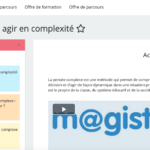Interested in a one-year action-research ?
And a more comprehensive approach for your context?
TRY TRANSFORMING YOUR CLASSROOM EXPERIENCE!![]()
![]() You are a school or a team of formal or non-formal schoolteachers and educators, decided on taking the time to understand and address complexity in your learning environments.
You are a school or a team of formal or non-formal schoolteachers and educators, decided on taking the time to understand and address complexity in your learning environments.
![]() You are keen on participating wholeheartedly in an action-research that will transform your classroom experience, both for you and your learners. This one’s for you.
You are keen on participating wholeheartedly in an action-research that will transform your classroom experience, both for you and your learners. This one’s for you.
![]() Five 2 to 3-day workshops, each in person and spread over one year will help you understand the basic notions; experiment with strategies, methods and tools to absorb them into your classroom practices and subject teaching; and address core standards.
Five 2 to 3-day workshops, each in person and spread over one year will help you understand the basic notions; experiment with strategies, methods and tools to absorb them into your classroom practices and subject teaching; and address core standards.
COMMON MODULE FEATURES![]()
![]() Your observations/themes/issues will form the basis for exploring and understanding all the concepts.
Your observations/themes/issues will form the basis for exploring and understanding all the concepts.
![]() Although not explicitly mentioned in the module descriptions here below, the program covers most of the ideas exposed on this site.
Although not explicitly mentioned in the module descriptions here below, the program covers most of the ideas exposed on this site.
![]() The workshops include a diversity of activities, methods, tools and collaborative and social approaches for use in your own classroom environments. Complementary online resources will also be indicated.
The workshops include a diversity of activities, methods, tools and collaborative and social approaches for use in your own classroom environments. Complementary online resources will also be indicated.
![]() The last session of each module will be devoted to designing concrete plans for classroom experimentation. Modules 2 to 5 will begin with a feedback session on these experiments and adapt to emerging ideas and problems.
The last session of each module will be devoted to designing concrete plans for classroom experimentation. Modules 2 to 5 will begin with a feedback session on these experiments and adapt to emerging ideas and problems.
![]() Participating teachers will identify specific subject matters, lessons or projects that can suitably be handled with the methods proposed and the prescribed core standards that are addressed in the process
Participating teachers will identify specific subject matters, lessons or projects that can suitably be handled with the methods proposed and the prescribed core standards that are addressed in the process
![]() And last but not the least, the entire program has complex thinking imbedded in it:
And last but not the least, the entire program has complex thinking imbedded in it:
diversity, flexibility, cooperation, empathy, coevolution…
Demystifying complexity and complex thinking
You will
 Be initiated to the theoretical underpinnings.
Be initiated to the theoretical underpinnings.
 Explore complexity in your own classrooms.
Explore complexity in your own classrooms.
 Understand and identify factors that create your experiences in this context.
Understand and identify factors that create your experiences in this context.
 Understand the notion of “emergence” and learn to observe it in your own learning spaces.
Understand the notion of “emergence” and learn to observe it in your own learning spaces.
 Collectively define one or two areas for action-research.
Collectively define one or two areas for action-research.
 Experiment with methods and tools in the chosen areas.
Experiment with methods and tools in the chosen areas.
 Design a plan for changing your classroom experience.
Design a plan for changing your classroom experience.
From objective to contextual knowledge
You will
 Be introduced to the concept of contextualisation – making sense of knowledge in a context
Be introduced to the concept of contextualisation – making sense of knowledge in a context
 Discover the principles and characteristics of a “context" or a “whole"
Discover the principles and characteristics of a “context" or a “whole"
 Discover a few methods and simple tools to learn
Discover a few methods and simple tools to learn
⇒ to “read" or make sense of a context as a whole
⇒ to identify leverage actions for desired futures
Reinforcing systems intelligence
You will
 Be introduced to systems archetypes
Be introduced to systems archetypes
 Be introduced to the systems thinking habits
Be introduced to the systems thinking habits
 Explore opportunities to reinforce these habits within the existing curricula
Explore opportunities to reinforce these habits within the existing curricula
 Create a systems thinking toolbox
Create a systems thinking toolbox
 Design a plan to introduce systems intelligence in your classrooms
Design a plan to introduce systems intelligence in your classrooms
Dialoguing with reality
You will
 Be initiated to some characteristics of complexity: connectedness of the whole, emergence, uncertainties, unexpected events, ambiguities, contradictions
Be initiated to some characteristics of complexity: connectedness of the whole, emergence, uncertainties, unexpected events, ambiguities, contradictions
 Explore the strategies needed to deal with such phenomena
Explore the strategies needed to deal with such phenomena
 Experiment with methods and tools to
Experiment with methods and tools to
⇒ develop divergent vs convergent thinking
⇒ develop resilience (diversity and flexibility) to deal with the unexpected
⇒ underline observation, risk-taking, letting-go, successive approximation
Assessing our experiences
 We will discuss the overall experience of our experiments with reality. But this last module will also cover complexity features that may have escaped the yearlong process.
We will discuss the overall experience of our experiments with reality. But this last module will also cover complexity features that may have escaped the yearlong process.
 It will conclude with a collective self-assessment exercise with ‘nature’ as a benchmark. Nature has been handling complexity and sustaining life since a few billion years. The idea is to check if we have acquired some of its soft skills?
It will conclude with a collective self-assessment exercise with ‘nature’ as a benchmark. Nature has been handling complexity and sustaining life since a few billion years. The idea is to check if we have acquired some of its soft skills?
Testimonials![]()
Do leave us a feedback![]()





 40 Avenue Hoche
40 Avenue Hoche +33 1 34809897
+33 1 34809897 +33 6 32280182
+33 6 32280182